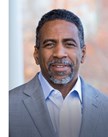Anne Reed
AFA Journal staff writer
December 2019 – Pro-abortion activists have worked tirelessly for decades establishing and preserving a woman-centered narrative concerning pregnancy. The deceptive messaging reached its wicked crescendo in 1973 when the U.S. Supreme Court established that a woman’s right to privacy in medical decision-making included abortion. Thoroughly disregarded were the child’s right to live and the father’s right to protect his child’s life.
Since then, ever increasing numbers of pro-life pregnancy centers have responded by compassionately addressing the needs of the mother and the baby. Within that paradigm, however, something was lacking.
 AFA Journal sat down with Roland Warren (photo, right), president and CEO of Care Net, a network of nearly 1,200 life-affirming pregnancy centers in North America. Under his Scripture-guided leadership, Care Net’s vision and outreach are expanding far beyond pregnancy
AFA Journal sat down with Roland Warren (photo, right), president and CEO of Care Net, a network of nearly 1,200 life-affirming pregnancy centers in North America. Under his Scripture-guided leadership, Care Net’s vision and outreach are expanding far beyond pregnancy
center walls.
The father’s heart
The most prominent unplanned pregnancy of all time provides invaluable insight and instruction. In this account, the pregnant, unwed teen was in danger of being stoned to death. It was the custom of her culture. It was a crisis of colossal significance.
“Joseph had a similar dilemma as any abortion-minded father,” explained Warren. “He had hopes and dreams for his life.”
The timing. The felt betrayal. The humiliation. The circumstances surrounding the unexpected pregnancy must have produced agony in his inner being as he weighed out the crushing options – none of which fit into the future he had envisioned.
Though Mary appeared to have committed adultery, Joseph resolved to protect her by quietly divorcing her.
“But after he had considered this, an angel of the Lord appeared to him in a dream and said, ‘Joseph son of David, do not be afraid to take Mary home as your wife, because what is conceived in her is from the Holy Spirit. She will give birth to a son, and you are to give him the name Jesus, because he will save his people from their sins’” (Matthew 1:20-21).
An ordered message
In keeping with ancient Hebrew culture, Joseph and Mary were waiting to consummate their relationship and move in together. In the meantime, their betrothal meant they were already considered man and wife in all legal and religious aspects.
In Joseph’s dream, the angel began his monologue by addressing the couple’s relationship, encouraging him to move forward with their life together, taking Mary into his home as his wife.
Then the angel shifted his attention to the womb, explaining who the child was and what His life would mean.
“He addressed the sanctity of marriage and the sanctity of their life together first,” Warren said. “In Scripture, order matters. To some degree, we haven’t focused enough on that. And it’s really been to our
detriment.”
Mother and child
“Mary also had hopes and dreams for her life with Joseph,” explained Warren. “It did not include a child at that time in that way. From Mary’s perspective, the pregnancy was unplanned. But God knows everything – past, present, and future.”
Mary had already been visited by the angel Gabriel who told her she would conceive a child by the Holy Spirit. Imagine her thoughts. Who would believe such a story? How would this affect her social standing, her family, her future?
Rather than focusing on the uncertainty, fearing the outcome, and worrying about the details, she responded in faith: “I am the Lord’s servant. May your word to me be fulfilled” (Luke 1:38).
“She focused on the certainty of what she did know,” said Warren. “She knew a life was growing inside her, and it was a life worth sacrificing for. So at Care Net, we are trying to help women ascribe to themselves the virtue and character of Mary. Despite the uncertainty of what they don’t know, they can tap into the certainty of what they do know.”
Conversely, he explained, “Abortion providers try to get women to disregard the certainty of what they do know – that a child is growing inside them – and make their decision on all the things they don’t know.”
The first pillar
“If I was building a house, I would need two pillars to hold up the roof. The first pillar would be the family – God’s design for family,” said Warren.
“Eighty-six percent of women who have abortions are unmarried. So, if we really want to reduce abortion, we actually have to improve marriage. And that’s why we never talk about the sanctity of life without talking about the sanctity of marriage.”
God could have easily arranged for Mary to raise Jesus as a single mother. But, for His own son, the Savior of the world, God incarnate, He provided a father – a family.
Care Net has intentionally drawn from this biblical ministry model for responding to unplanned pregnancies.
A 2015 Care Net survey of 1,000 post-abortive women revealed the most influential person in a mother’s pregnancy decision is the father of the unborn child. However, the pregnancy center ministry model has often neglected the father in the past. But when he is included, it opens the door to minister hope to the family as a whole.
“However, it’s not logical or consistent that in every situation, the mother should marry the guy who got her pregnant,” said Warren. “But we should certainly be trying to build strong families in cases where we can. Even if she doesn’t marry him, we still want her to have a high appreciation for God’s design.”
The second pillar
“The second pillar is God’s call to discipleship,” explained Warren. “This is where you transition from being pro-life to pro-abundant-life as described in John 10:10.”
Care Net envisions a culture where women and men faced with pregnancy decisions are transformed by the gospel of Jesus Christ and empowered to choose life for their unborn children and abundant life for their families. And the local church is key in fulfilling the mission.
“The pregnancy center can do evangelism, which leads to conversion,” Warren said. But once a client has a conversion experience, she will either go back into a discipleship relationship with the culture or transition to the church for ongoing support and discipleship.
“The church has not been necessarily equipped to retrieve people from pregnancy centers who are facing pregnancy decisions or to receive people within the church who are at risk for abortion.”
Care Net’s survey also found that more than one in three women were attending a Christian church once a month or more at the time of their first abortion. Both church-goers and non-church-goers said they either received or expected “judgmental” (one in three) or “condemning” (one in four) reactions from local churches.
And though some church-goers reported positive expectations or reactions from the church, “God calls us not just to be good, but to be great,” said Warren. “There’s nothing closer to the gospel of Jesus Christ than this. Our entire faith started with an unplanned pregnancy from a human perspective. To what end? So that we might become disciples of Jesus Christ.” 
 Learn more
Learn more
Visit care-net.org or call 703-554-8734.
Making Life Disciples is a Care Net tool that teaches men and women in the church how to reach and disciple men and women facing pregnancy decisions. Go to makinglifedisciples.com.
Scroll down to “Sign Up Now” and complete the short form. A regional coordinator will contact you by phone to coach you through the process of bringing Making Life Disciples to your church.